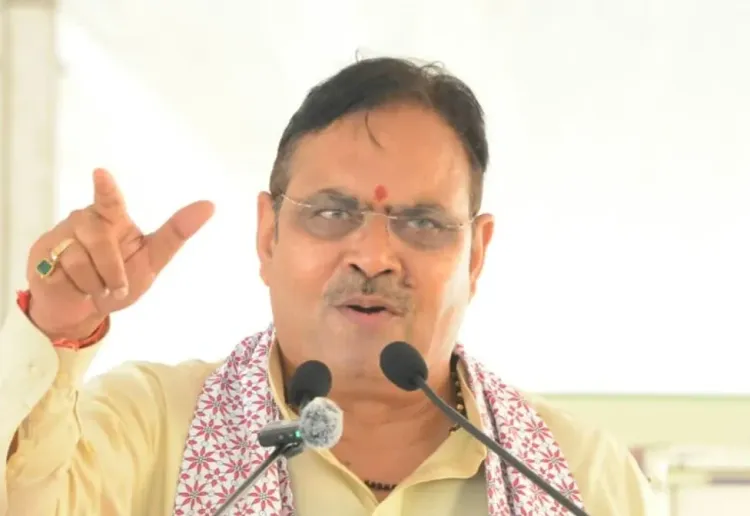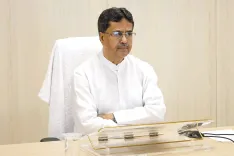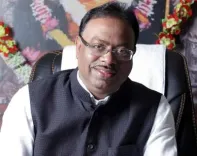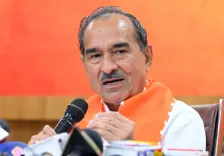How Is Rajasthan Government Planning to Top National Milk Production Charts?

Synopsis
Key Takeaways
- Rajasthan government aims to lead national milk production.
- Special initiatives target border district dairy farmers.
- Health and accident insurance included for farmers.
- Financial support for daughters' weddings under new scheme.
- Sustainable energy solutions through biogas plants.
Jaipur, July 3 (NationPress) In a bid to secure Rajasthan's position at the forefront of national milk production, the state government has unveiled a set of special welfare programs designed to assist dairy farmers, especially those in border districts.
“Our current focus is on towns bordering Gujarat, ensuring that local farmers benefit from optimal facilities and do not have to venture into neighboring states to market their products,” officials informed IANS.
As per the National Dairy Development Board, Rajasthan is presently the second-largest milk producer in the country, following Uttar Pradesh. In 2024, Uttar Pradesh achieved a production of 38 million metric tonnes, while Rajasthan managed 34 million metric tonnes.
“The margin is slim, and we are resolute in our efforts to bridge it,” added an official.
A crucial component of this initiative is the launch of a significant welfare program aimed at dairy farmers in the border districts of Udaipur, Banswara, Barmer, and Raniwara (Jalore).
This initiative is set to impact over 20,000 registered milk producers, with goals of improving infrastructure, increasing income levels, and enhancing social and health security for rural farmers.
The Rajasthan Co-operative Dairy Federation (RCDF), under the guidance of State Minister of State Joraram Kumawat, has been mandated to roll out various support measures.
One notable feature of the program is an added bonus of Rs 2 per litre under the Border State Policy, supplementing the current Rs 5 per litre incentive from the Chief Minister Milk Producer Sambal Yojana. Dairy unions in these regions are currently collecting around 1.75 lakh kg of milk on a daily basis.
The new initiatives are projected to provide direct benefits to 20,786 cattle farmers, including 11,447 in Udaipur, 5,160 in Raniwara-Jalore, 2,226 in Barmer, and 1,953 in Banswara. Alongside income support, the program also features affordable health and accident insurance.
For just Rs 370, covering 10 percent of the total premium, up to four family members of each registered cattle farmer will be eligible for a health insurance plan valued at Rs 2.5 lakh.
An accident insurance policy worth Rs 5 lakh will be available for a nominal premium of Rs 14. In cases of accidental death, the family will receive Rs 5 lakh; for permanent disability, Rs 2.5 lakh. The remaining 90 percent of the premium will be covered by the RCDF and respective milk unions.
In a socially conscious step, the RCDF will also provide marriage assistance for the daughters of registered farmers. Under this initiative, the government will allocate Rs 21,000 as part of the traditional 'Mayra' during a daughter's wedding. This measure not only offers financial support but also fosters gender equality, discourages child marriage, and fortifies the rural social structure.
To promote the use of sustainable energy, the initiative will facilitate the installation of Flexi Biogas Plants in the residences of registered dairy farmers. Each unit, priced at around Rs 37,000, will receive a subsidy of Rs 29,000. These biogas systems can generate fuel equivalent to two LPG cylinders monthly, aiding in the reduction of household fuel costs and encouraging eco-friendly practices.
To further enhance profitability, each district's dairy union will appoint a qualified marketing consultant, with their salary and operational costs funded by the RCDF. This initiative aims to broaden the market reach and revenue for the unions. Additionally, payments for milk procurement will now be directly credited to farmers’ bank accounts, eliminating intermediaries and ensuring improved transparency.
The program also encompasses upgrades to milk processing facilities across all four districts, with funding sourced from the RCDF’s rehabilitation fund. Through this comprehensive action plan, the government led by Bhajan Lal Sharma reaffirms its dedication to bolstering the livelihoods of dairy farmers in Rajasthan’s border regions and positioning the state as a frontrunner in the country’s dairy industry, officials stated.








